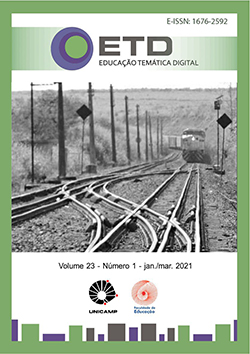Abstract
This paper examines the concept of innovation in teaching practices by presenting the perceptions of teachers and students about innovative practices using digital technologies. The theoretical groundwork of this study is a research on innovative teaching practices using digital technology in initial teaching certificate courses, which focused on the identification of these practices, as well as on identifying their characteristics and contexts within the institutional setting. The following sequence defines the methodological design of this paper: bibliographic review, analysis of the courses’ outlines, application of questionnaires and interviews, and the analysis of the data. The data collected through 220 respondents to an online questionnaire and through 45 respondents to a semi-structured interview comprise the empirical basis of this study. The subjects of both questionnaire and interview were students and professors of teaching certificate courses in a public institution of Higher Education. The analysis indicates that the innovation of teaching practices with digital technologies relates to three factors: a favorable institutional setting, the courses curriculum and, mainly, the continuous teacher training. It was possible to conclude that innovation seems to correspond to a cultural change which involves appropriation of concepts and teaching practices using these technologies.
References
BARDIN, Laurence. Análise de conteúdo. 3. ed. Tradução Luís Antero Reto e Augusto Pinheiro. Lisboa: Edições 70, 2006.
BUZATO, Marcelo El Khouri. Cultura digital e apropriação ascendente: apontamentos para uma educação 2.0. Educação em Revista, Belo Horizonte, v. 26, n. 03, dez. 2010. Disponível em: http://www.scielo.br/pdf/edur/v26n3/v26n3a14.pdf. Acesso em: 15 mar. 2018.
CANÁRIO, Rui. A escola tem futuro? Das promessas às incertezas. Porto Alegre: Artmed, 2006.
CANÁRIO, Rui. A inovação como processo permanente. Revista da Educação, Lisboa, n. 2, 1987.
DÍAZ BARRIGA, Ángel. El enfoque de competencias en la educación. ¿Una alternativa o undisfraz de cambio? Perfiles Educativos, n. 28, jan./mar. 2006. Disponível em: https://bit.ly/2FmAQnZ. Acesso em: 15 mar. 2018.
KENSKI, Vani Moreira. Tecnologias e tempo docente. Campinas, SP: Papirus, 2013.
MCLUHAN, Marshall. Os meios de comunicação como extensões do homem. Tradução de Décio Pignatari. São Paulo: Cultrix, 1964.
AUTORA Y. Inclusão digital e educação: a nova cultura da sala de aula. Petrópolis/Rio de Janeiro: Vozes/PUC-Rio, 2016.
POSTMAN, Neil; WEINGARTNER, Charles. Contestação: nova fórmula de ensino. Tradução de Álvaro Cabral. 3. ed. Rio de Janeiro: Expressão e Cultura, 1974.
ROMANÍ, Cristóbal Cobo. ¿Y si las nuevas tecnologí as no fueran la respuesta? In: PISCITELLI, Alejandro; ADAIME, Iván; BINDER, Inés. (Org.). El proyecto Facebook y la Posuniversidad. Sistemas operativos sociales y entornos abiertos de aprendizaje. Buenos Aires: Ariel/Fundación Telefónica, 2010.

This work is licensed under a Creative Commons Attribution-NonCommercial-NoDerivatives 4.0 International License.
Copyright (c) 2021 ETD - Educação Temática Digital


